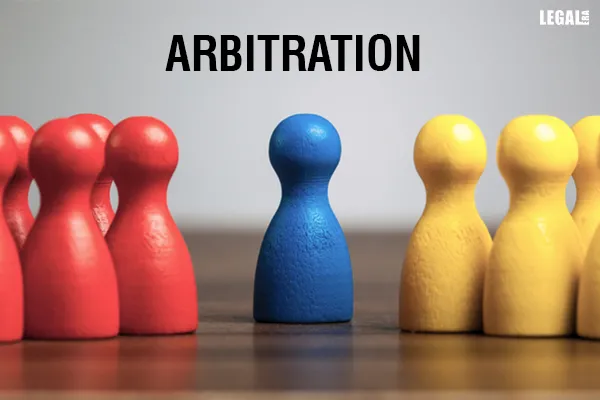Delhi High Court Rules that Rejection of Impleadment Application by Arbitral Tribunal Not an ‘Interim Award’
The Delhi High Court has stated that in arbitration proceedings, a non-signatory to the arbitration agreement may be added;

Delhi High Court Rules that Rejection of Impleadment Application by Arbitral Tribunal Not an ‘Interim Award’
The Delhi High Court has stated that in arbitration proceedings, a non-signatory to the arbitration agreement may be added as a necessary party.
The duo of Justices Najmi Waziri and Sudhir Kumar Jain held that an order from the Arbitral Tribunal that dismisses a plea to include parties in the arbitration process does not qualify as an 'interim award' as per the Arbitration and Conciliation Act, 1996 (A&C Act). This is because such an order does not address any significant legal issues or concern the substance of the case.
According to the bench, the third parties that the claimant wanted to add to the arbitration proceedings were not essential or suitable for resolving the claims made by the claimant.
The Court observed that for an order from the Arbitral Tribunal to be considered an interim award, it must resolve significant issues or settle a substantial claim that the parties have raised.
Goyal Mg Gases Pvt Ltd, the appellant, entered into multiple sale agreements with the respondents, who were the proprietors of various windmill projects, including Panama Infrastructure Developers Pvt Ltd. The dispute arose when the respondents terminated the Agreement to Sell without notice. The parties referred the issue to arbitration to resolve the dispute.
While the arbitration process was ongoing, Goyal Mg Gases, the claimant, filed an application before the Sole Arbitrator under Order 1 Rule X of the Civil Procedure Code, 1908 (CPC) to add transferees as parties to the arbitration. The transferees were individuals or entities to whom the respondents had purportedly sold and transferred the windmill projects, breaching the Sale Agreement that they had signed with Goyal Mg Gases.
The Sole Arbitrator denied the application, stating that the third parties that Goyal Mg Gases wanted to add were not crucial or suitable parties. The Arbitrator also believed that the arbitration process between Goyal Mg Gases and the respondents could continue without the third parties being included as parties.
Goyal Mg Gases contested the Sole Arbitrator's decision by submitting a petition under Section 34 of the A&C Act to the Delhi High Court. However, the Single Judge rejected the plea, stating that the order made by the Tribunal did not meet the requirements of an 'interim award' that could be appealed under Section 34.
Goyal Mg Gases filed an appeal with the Division Bench of the High Court under Section 37 of the A&C Act after the Single Judge's decision. The appellant argued that a third party, who did not sign the arbitration agreement but purchased the project later, could be added to the arbitration proceedings.
In response, Panama Infrastructure Developers contended that only parties to an agreement are subject to arbitration proceedings and that no third party should be added to the arbitration process.
After considering the Supreme Court's rulings in Chrolo Controls India Pvt Ltd vs. Severn Trent Water Purification Inc. & Ors. (2012) and Cheran Properties Ltd. vs. Kasturi & Sons Ltd., (2018), the High Court concluded that a non-signatory to the agreement could be added as a necessary party in the arbitration proceedings.
Regarding the question of whether the Arbitral Tribunal's decision to reject the claimant's request to add parties could qualify as an 'interim award' under the A&C Act, the Court stated, “It is reflecting that an order would said to be an award or interim award when it decides a substantive dispute which exists between the parties. It is essential before an order can be understood as an award that it answers the attributes of the decision on the merits of the dispute between the parties or accords in conclusively settling a dispute which pertains to core issue.”
The Court explained that for an Arbitral Tribunal's order to qualify as an award, it must pertain to a significant matter that is a crucial aspect of the dispute between the parties.
The Court referred to the Delhi High Court's ruling in Rhiti Sports Management Pvt. Ltd. vs. Power Play Sports & Events Ltd. (2018) and emphasised that an order passed by the arbitral tribunal could qualify as an interim award only when it resolves significant matters or disposes of a substantive claim raised by the parties.
According to the bench, the Arbitral Tribunal's order denying the application for impleadment of parties did not address any substantive legal issues or the merits of the case. Therefore, it did not meet the criteria to be considered an 'interim award,' the Court concluded.
“Accordingly, an order passed by the Arbitral Tribunal rejecting the application for impleadment neither decides the substantive question of law nor touches upon the merits of the case. The impugned order, as such, has not travelled the distance to answer the attributes of determination of an issue,” the bench held.
The Court added that the Sole Arbitrator's observation that the subsequent transferees were not necessary or proper parties for the disposal of the claims was correct. The Court noted that the arbitral proceedings could proceed between the appellant and the respondents, and if the decree was passed in favour of the appellant, then the subsequent sale agreement would become null and void. Based on this, the Court dismissed the appeal.

